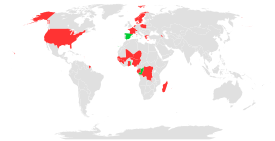Rotterdam Rules
| United Nations Convention on Contracts for the International Carriage of Goods Wholly or Partly by Sea | |
|---|---|

Signatories (red) and Ratifications (green)
|
|
| Drafted | 11 December 2008 |
| Signed | 23 September 2009 |
| Location | Rotterdam and New York |
| Effective | (not yet in force) |
| Condition | Ratification by 20 states |
| Signatories | 25 |
| Ratifiers | 3 (Republic of the Congo, Spain, and Togo) |
| Depositary | UN Secretary-General |
| Languages | Arabic, Chinese, English, French, Russian and Spanish |
The "Rotterdam Rules" (formally, the United Nations Convention on Contracts for the International Carriage of Goods Wholly or Partly by Sea) is a treaty proposing new international rules to revise the legal framework for maritime affreightment and carriage of goods by sea. The Rules primarily address the legal relationship between carriers and cargo-owners. As of October 2015, the Rules are not yet in force as they have been ratified by only three states.
The aim of the convention is to extend and modernize existing international rules and achieve uniformity of International trade law in the field of maritime carriage, updating and/or replacing many provisions in the Hague Rules, Hague-Visby Rules and Hamburg Rules. The convention establishes a comprehensive, uniform legal regime governing the rights and obligations of shippers, carriers and consignees under a contract for door-to-door shipments that involve international sea transport.
The Hague Rules of 1924 were updated in 1968 to become the Hague-Visby Rules, but the changes were modest. The modified convention still covered only "tackle to tackle" carriage contracts, with no provision for multimodal transport. The industry-changing phenomenon of containerization was barely acknowledged. The 1978 Hamburg Rules were introduced to provide a framework that was both more modern, and less biased in favour of ship-operators. Although the Hamburg Rules were readily adopted by developing countries, the new convention was shunned by richer countries who stuck with Hague and Hague-Visby. It had been expected that a Hague/Hamburg compromise might arise, but instead the vast (96 articles) Rotterdam Rules appeared.
The final draft of the Rotterdam Rules, which was assembled by the United Nations Commission on International Trade Law, was adopted by the United Nations on 11 December 2008, and a signing ceremony was held in Rotterdam on 23 September 2009. Signatories included the United States, France, Greece, Denmark, Switzerland and the Netherlands; in all, signatures were obtained from countries said to make up 25 percent of world trade by volume. Signatures were allowed after the ceremony at the U.N. Headquarters in New York City, United States.
...
Wikipedia
